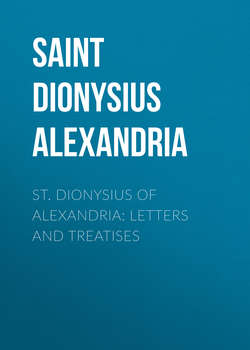Читать книгу St. Dionysius of Alexandria: Letters and Treatises - Saint Dionysius of Alexandria - Страница 18
INTRODUCTION
Dionysius as Interpreter of Scripture
Оглавление23. To what extent did Dionysius accept the principles and methods of Origen, especially in the matter of Biblical criticism and interpretation? The evidence, such as it is, is rather doubtful and conflicting. It is somewhat ominous that after the death of Bishop Demetrius, whose denunciations had caused the master’s removal from Alexandria and his retirement to Cæsarea, we hear of no effort on the part of Dionysius or of any other pupil to obtain his recall. This certainly suggests that, great as their regard and respect for him as a man and a scholar may have been, they either felt themselves powerless to reinstate him, or else considered his views and methods of advocating them detrimental to the welfare of the Church at large. On the other hand, it is pleasing to remember that Dionysius wrote an epistle to his old teacher on the subject of martyrdom, which we may presume was designed to comfort him during his imprisonment at Tyre. We learn, too, on somewhat late authority that after Origen’s death Dionysius wrote a letter to Theotecnus, Bishop of Cæsarea, extolling his master’s virtues. The chief methodical comments on the Bible, of the authenticity of which we may be certain, are those contained in the fragments of the treatise On the Promises (περὶ Ἐπαγγελιῶν), reproduced on pp. 82 ff. This was a direct reply to the Refutation of Allegorists (Ἔλεγχοσ Ἀλληγοριστῶν), in which Nepos of Arsenoe had thought to support his grossly materialistic views of the Millennium by the Revelation of S. John the Divine. As the title suggests, this work had, no doubt, attacked Origen’s fondness for the allegorical interpretation of Scripture, and especially on the subject of the Millennium, and therefore we may with some amount of certainty infer that Dionysius in his refutation of Nepos would accept Origen’s methods as a commentator. But the extracts preserved by Eusebius deal almost wholly with the authorship and textual criticism, and so give no proper clue as to his method of interpreting the subject-matter of the book.
In the letter to Basilides (pp. 76 ff.) the requirements of the case do not call for a style of interpretation which would bring out either a correspondence or a disagreement with Origen’s methods, except so far as it is marked by the frank and free exercise of critical judgment. The commentary on the Beginning of Ecclesiastes, if it is, as seems likely, in part the work of Dionysius, is not inconsistent in style of treatment with a general acceptance of his master’s position. Procopius of Gaza, however, ranks him among the opponents of the allegorical school of interpreters, stating that it was in this very work that Dionysius attacked his master, and a short extract which has been assigned to it by Pitra (Spic. Solesm., i, 17) is distinctly less allegorical in treatment than the rest: it runs as follows —
“On Eccles. iv. 9, 10: ‘Two are better than one,’ etc. As we understand this literally, we do not admit those who accept the interpretation of the statements as referring to the soul and the body; for it is by no means justified, seeing that the soul has the entire control over the ruling and governing both of itself and of the body, whereas the body is the bondman of the soul, subservient and enthralled to it in all its decisions. If, then, the soul be inclined to what is mean and evil, and become careless of better thoughts and considerations, the body is unable to restore it and lead it back to higher things: for that is not natural to it.”
There is also another short extract (on Gen. ii. 8, 99) attributed to our author, which is non-allegorical in its treatment. The evidence therefore is inconclusive on this point: for though Jerome also mentions Dionysius as a commentator on the Bible three times in his letters, he throws no further light on the question.10
On the subject of Inspiration we have no ground for thinking that Dionysius took up an independent position.11 He introduces his Biblical quotation with the phrases current amongst early Christian writers.
The general impression therefore left upon the reader is that Dionysius reverted to the more sober methods of interpreting Scripture that prevailed throughout the Church of his day as a whole, though he approached his master’s theories in his usual sympathetic spirit and availed himself of much that was valuable in them.
9
The particular passage, however, adduced by Procopius above is Gen. iii. 21.
10
On this point C. H. Turner’s article in Hastings’s Dictionary of the Bible, Vol. V, pp. 496 f. (on Patristic Commentaries), may be consulted.
11
The passage on Luke xxii, quoted by Dr. Sanday (Inspiration, p. 36), is of very doubtful authenticity.
